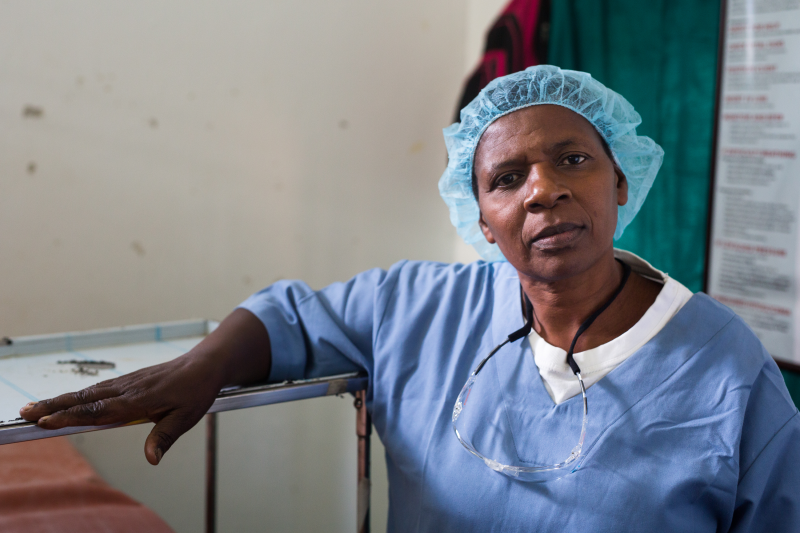Where We Work
See our interactive map


When Chausiku, 15, did not show up at school to begin Form One in Mara region, Tanzania, she was just another name on a list of new students. However, one teacher took it seriously, and asked her whereabouts from other pupils.
The answer: she is at home—a bride price has been received for her, a marriage is scheduled. Her teachers consulted Chausiku’s father, whose recalcitrance prompted them to involve village leaders, who in turn called the local police—a route that perpetrators of gender-based violence in Mara often outsmart through bribery.
Taking advantage of a new connection, the teachers alerted the Tarimerorya special police zone’s coordinator of the gender desk. The local police and village leaders swooped on the father. He was ordered to cancel the wedding and let his daughter attend school. If he refused, he would be arrested. Now Chausiku attends classes like other kids. Occasionally the school has to supplement her school supplies, though, because her parents have not softened completely.
This is Mara, a region in Tanzania where 72% of women 15-49 years old have experienced physical or sexual violence at the hands of their husbands or partners. The national average is 44%.
Female genital mutilation, assault, rape, and violation of girls’ rights often go unreported.
This heroic tale, wherein a whole village helps free one girl from the grips of a tradition that not only condones gender disparity but practices it with impunity, illustrates that everyone—pupil, teacher, father, mother, police village leader—has a role to play in preventing gender-based violence.
In a country where female genital mutilation, assault, rape, and violation of girls’ rights often go unreported, IntraHealth International has been working to reduce gender-based violence in Mara through its Tanzania HIV Prevention Project.
And as we approach International Women’s Day, we’re looking back on the progress we’ve made during the last three years by focusing on:
Mara region’s high rate of violence against women is part of the reason HIV prevalence there rose from 3.2% in 2003 to 7.5% in 2009, while national HIV prevalence dropped from 7% in 2003 to 5.3% in 2010.
Over the past three years, we have helped train 180 frontline health workers from 43 facilities to manage cases related to gender-based violence. Our baseline assessment in 2012 showed that 88% of health workers were unprepared for such cases, though they often encountered them while providing HIV testing and other health services.
But perhaps even more effective are the linkages we have made. Chausiku’s teacher met the police officer who helped them in meetings facilitated by IntraHealth to build working relations between officers in institutions that frequently come across cases of gender-based violence.
In hindsight, working relationships such as this seem obvious, but they did not exist before.
“Nowadays when I meet a police officer, I know I have a work-related issue to talk about with them,” says Sauli Rocko, a social welfare worker in Mara region’s Rorya district.
On several occasions he has worked together with local police officers to collect evidence, apprehend perpetrators, and provide counselling. His nickname is Mr. Compassion. Perpetrators often ridicule his popularity with victims. Compassion towards women “disciplined” by other men is incompatible with men in the male dominance culture.
Fear of social reprisals often prevents women from testifying in court when police arraign perpetrators.
His nickname reflects the depths of cultural and economic relations that make up the foundation of gender-based violence. The disparity between men and women goes so deep that even small actions to combat it yield serious resistance, stigma, ostracism, and ridicule.
For example, fear of social reprisals often prevents women who report gender-based violence from testifying in court when police arraign perpetrators. Out of 1,992 cases of gender-based violence that were referred to police, only 745 reached a stage of seeking legal aid to continue to trial. Most were dropped because the victims surprised prosecutors by siding with the perpetrators during trial, or refused to testify at all.
“The reason is dependency on the perpetrator, who owns all property,” says Saumu Ngoma, gender desk coordinator in Tarimerorya. “Also, families of victims push them back to live with the perpetrators.”Efforts by Chausiku’s new classmates, her teacher, police, Sauli, and others emphasize how everyone in a victim’s sphere of influence can commit to helping end an act of gender-based violence or question the socially approved relationships that condone gender disparity and provide a platform for further inequality and violation.
Chausiku’s teacher was among those from seven primary and secondary schools in Mara region that were involved in IntraHealth’s program to trigger linkages among schools, health facilities, law enforcement, social welfare, and parents—all to create greater security against gender-based violence.
One IntraHealth program called HELP—or the Health and Education Learning Partnership—built a learning environment among clinical practitioners, teachers, pupils, and parents to make children aware of gender-based violence from a young age. Additionally, it widened the linkages that foster collaboration by school, health facilities, law enforcement, social welfare departments, and local leaders in preventing and responding to incidents of violence.
Communication (and bravery) among these collaborators helped save Chausiku from an early marriage. They can save hundreds of others, too.
IntraHealth’s Tanzania HIV Prevent Project is funded by PEPFAR through the US Centers for Disease Control and Prevention.
Photo by Trevor Snapp for IntraHealth International.
Get the latest updates from the blog and eNews




